Refrigerant oil, folks, is the unseen, often ignored, yet vital cog in the machine of our cooling and air conditioning systems. Imagine the heart pumping blood to all parts of our body, keeping us alive. That’s refrigerant oil for you – circulating throughout the system, ensuring everything runs smoothly.

Table of Contents
What is Refrigerant Oil?
Ah, but what is this mystery fluid really? Well, pull up a seat and lend me an ear…
Basic Definition
Refrigerant oil, in the simplest terms, is a special kind of lubricant used in cooling systems. It’s not your everyday engine oil – oh no – it’s designed to withstand cold, heat, and everything in between.
Types of Refrigerant Oil
There’s a smorgasbord of refrigerant oils out there – mineral oils, alkylbenzene oils, and polyolester oils, just to name a few.
Role of Refrigerant Oil in Cooling Systems
And what, you may ask, does refrigerant oil actually do in a cooling system? Good question!
Lubrication
Refrigerant oil acts as the grease in the wheels of our cooling systems. Without it, the gears grind, the cogs creak, and the compressor – the heart of the system – could seize up. Not a pretty picture, huh?
Heat Transfer
But it’s not just about the lubrication. This oil is a real multitasker! It also helps in heat transfer, ensuring your ice cream doesn’t turn into soup on a hot summer day.
Sealing
And believe it or not, it also helps seal the system, preventing leakage of refrigerant gas. Quite the all-rounder, don’t you think?
Selecting the Right Refrigerant Oil
Now that we’ve covered the basics, how do you go about choosing the right oil? Read on, friends, read on…
Compatibility with Refrigerant
The refrigerant oil has to be a perfect match with the refrigerant used in your system. Think of them as partners in a dance – they have to move together, or the whole thing falls apart.
Hydrochlorofluorocarbon (HCFC) and Chlorofluorocarbon (CFC) Systems
Older systems with HCFC or CFC refrigerants typically use mineral oil. It’s like the classic combo of peanut butter and jelly, you know?
Hydrofluorocarbon (HFC) Systems
Newer systems with HFC refrigerants, on the other hand, prefer synthetic oils, like polyolester. It’s a modern twist on the old classic, like avocado toast.
Understanding Oil Specifications
Just like you’d check the specs of a new smartphone, you gotta understand the specs of your refrigerant oil.
Viscosity
Viscosity is all about how thick the oil is. Too thick, and it won’t flow; too thin, and it won’t lubricate properly. It’s a delicate balance!
Flash and Fire Points
The flash and fire points are about safety. You don’t want your oil catching fire at the drop of a hat, do you?
Pour Point
The pour point is the lowest temperature at which the oil can still flow. You wouldn’t want your oil freezing up on a cold day, would you?
Click here for more articles similar to this one – – Articles on Refrigerants: The Ultimate Guide to Understanding Them
Maintenance of Refrigerant Oil in a System
Maintenance, my friends, is key. Even the best oil won’t do much good if it’s not properly maintained.
Regular Checks for Oil Level
Regular checks for oil level are as important as checking the fuel gauge in your car. You wouldn’t want to run out of gas on a highway, right?
Oil Changes
Just like your car needs regular oil changes, so does your cooling system. Keeps things running smooth and easy!
Avoiding Contamination
Avoiding contamination is crucial. Dust, dirt, and moisture can really muck up the works!
Troubleshooting Common Problems
Problems will arise – it’s a fact of life. But fret not, here’s a handy guide to troubleshooting the most common issues.
Excessive Noise from Compressor
If your compressor’s making more noise than a rock band, it could be a sign of low oil.
Poor Cooling
Poor cooling could be a sign of oil contamination or the wrong type of oil.
System Failure
And if the system fails completely, it could be a serious oil issue. Time to call in the pros!
Conclusion: The Importance of Proper Refrigerant Oil Management
In conclusion, the right refrigerant oil, properly maintained, is crucial for a smooth, efficient cooling system. It’s like the heartbeat of the whole operation. Without it, things grind to a halt. So give it the love and attention it deserves. Remember, the heart of your cooling system is in your hands!